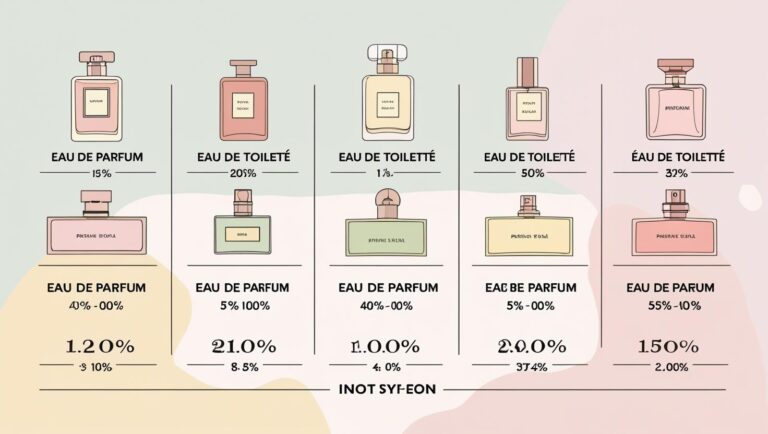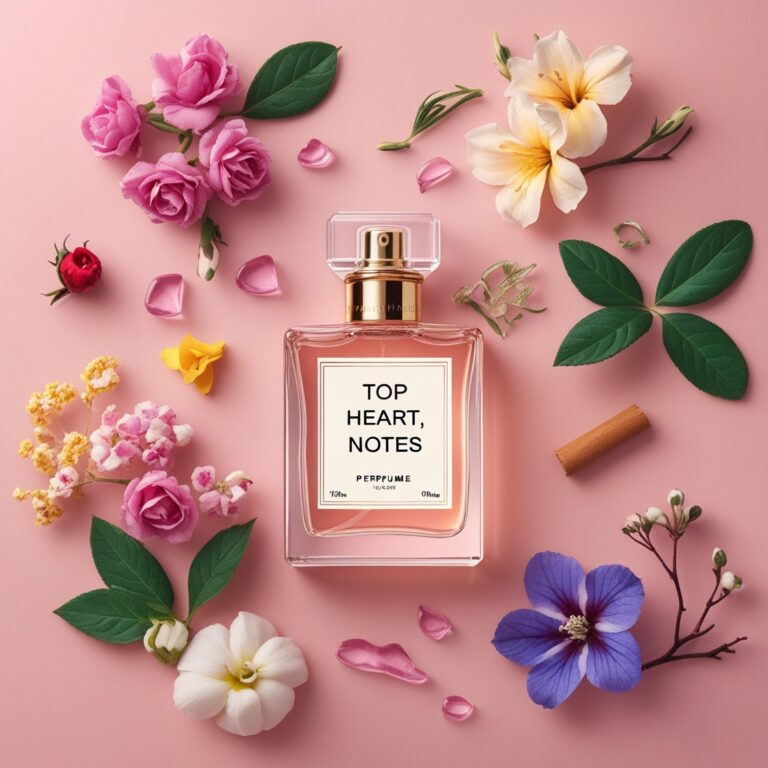What are11Factors Should You Consider Before Buying Perfume?
Scent Profile (Fragrance Notes)

Perfumes consist of three main parts: top notes, heart notes, and base notes. Top notes hit you first with scents like bergamot and citrus. Heart notes come next with smells such as iris and honey.
Base notes emerge slowly but stay long, offering deep aromas like sandalwood.
Each perfume belongs to a specific family: Oriental, Woody, Citrus, or Gourmand. Your style can guide you to the right family. If sweet scents appeal to you, a Gourmand fragrance featuring vanilla or caramel could be ideal.
This knowledge makes shopping for new perfumes fun as you discover variations within your preferred groups.
Longevity & Performance

Exploring scent profiles reveals that perfume longevity varies. Longevity is how long the fragrance stays on your skin. Performance means how noticeable the scent is to others around you.
Some perfumes fade fast, while others last all day with a single spray. Eau de parfum has more staying power than eau de toilette because it contains more fragrance oils. Typically, an eau de parfum can linger for 8 hours, whereas an eau de toilette might only remain for about 4 hours.
Your body chemistry plays a big role in this too. Since everyone’s body odor is unique, it can alter how a perfume smells and its durability. To see how a perfume performs on you, apply it to your pulse points like the wrists or neck. These areas are warmer and help disperse the scent better across your body, showing true performance throughout the day.
Experimenting with different types such as colognes or evening fragrances helps determine what suits you best in various situations.
Ingredients & Composition
Perfumes are made of water, alcohol, and scent oils. These oils can be natural or synthetic. The first scent you notice in a perfume is the top note, which fades fast. Heart notes form the core smell and last longer.
Base notes linger the longest on your skin.
Your skin chemistry affects how a perfume smells on you. This happens because your body’s natural oils mix with the perfume, creating a unique scent for each person. So, two people may smell different wearing the same perfume.
When picking a fragrance, consider these details to choose one that suits you best.
Perfume Type / Concentration
Perfumes vary in strength, such as Eau de Cologne (EDC), Eau de Toilette (EDT), Eau de Parfum (EDP), and Parfum. The difference lies in the amount of scent mixed with alcohol or water. Parfum contains the most fragrance and lasts the longest, while EDC has less fragrance, making it lighter and short-lived. Selecting a type depends on use and preference. EDT works well for daily wear because it’s lighter. For evenings or special occasions, choose an EDP or Parfum for a more lasting effect. Always consider these points before purchasing to ensure the best match for your needs.
Skin Chemistry
Your skin chemistry changes how perfume smells on you. Age, skin type, and diet can affect a scent’s uniqueness. A fragrance might smell good on a friend but different on you because your skin oils mix with the perfume’s notes—top, heart, and base—to create a unique aroma. For better scent release over time, apply perfume to warm pulse points like wrists or behind ears. As you age, your fragrance preferences may shift due to changes in body chemistry. Trying different scents is key to finding what suits your personal chemistry at any stage of life.
Budget & Price Range
Perfume prices vary, especially between types like perfume and eau de parfum. Stronger fragrances tend to cost more. However, many retailers offer discounts on bundles. It’s smart to have a budget for shopping. This prevents overspending while searching for the right scent. Keep track of favorite smells and look out for sales. Choosing a signature scent is important. It makes a strong impression before speaking.
Brands and their reputations matter too in perfumery.
Brand & Reputation
Dior and Dolce & Gabbana are big names in the perfume industry, known for their popular scents. In France, Angel by Thierry Mugler sells very well, showing that famous brands often do better.
Your choice of perfume reflects your age, gender, and personality. During Christmas, stores offer special deals on certain brands. This makes some perfumes more noticeable during the holiday season.
The scent you choose sends a message about who you are.
Purpose & Occasion
Choosing the right perfume depends on when and why you plan to wear it. Evening fragrances, perfect for going out at night, usually have rich scents. Light, fresh scents work better for daytime or office use.
Seasons also affect the best perfume choice. Summer is ideal for light, citrusy fragrances, while winter calls for warmer, spicier ones.
Your perfume reflects your style and identity. Age and personality help in finding your signature scent – a fragrance that truly represents you. Whether bold, playful, or sophisticated, it’s key to match the fragrance with your personal vibe.
Allergies and sensitivities are important considerations too.
Allergies & Sensitivities
Before picking a perfume, check for allergies or sensitivities. Some ingredients in fragrances can cause reactions like redness or itchiness. Perfumes contain oils, alcohol, and other compounds that might not suit everyone.
Ingredients from flowers and trees are common, but they can also trigger allergic reactions.
To avoid problems, test the perfume on a small skin area first. The wrist or elbow is ideal. Wait 24 hours to see if there’s any reaction. This testing helps ensure the perfume is safe for broader use on pulse points such as the neck and wrists.
Also, look at fragrance notes provided by the perfumers. These notes reveal what’s inside the perfume so you can avoid those with allergens known to affect you.
Testing Before Buying
To pick the right perfume that matches your skin chemistry and tastes, follow these steps:
- Use paper strips for a first scent impression to avoid overwhelming your nose.
- Clear your nose by smelling coffee beans between testing different perfumes. This prevents “nose fatigue.”
- Dab a little perfume on pulse points like wrists or behind ears for best results.
- Let it dry without rubbing to keep the true smell.
- Pay attention to all fragrance notes – top, heart, and base – they appear at different times.
- Test the perfume over a few hours to see how it blends with your body chemistry during the day.
- Try out seasonal scents which may fit better with certain times of year.
- Think about when you’ll wear it, such as daily or for evening events.
- Decide on the concentration you prefer: eau de cologne (EDC), eau de toilette (EDT), or eau de parfum (EDP).
- Check ingredients for any potential allergy triggers.
- Consider if this scent makes you feel confident and if it could be your signature scent.
By following these guidelines, you can find a fragrance that truly represents you and how others perceive you.
Personal Preference & Emotional Connection
Personal preferences shape perfume choices. Likes and memories influence shopping for fragrances. Age impacts preference, important when buying for someone else. Personal experiences lead to exploring new scents.
Knowing personal style helps in choosing the right fragrance. Consideration of occasion and season is crucial; lighter scents are better for summer.
Skin testing is essential before purchase due to unique body chemistry and pulse points affecting scent. Each person’s skin reacts differently, making fragrance choice highly personal.
FAQs
1. What are the key factors to consider when buying a perfume?
When buying a perfume, it’s crucial to consider fragrance families, top notes, heart notes and your skin chemistry. Also important is how the scent fits with different seasons and whether it suits for day or evening wear.
2. How do seasonal scents influence my choice of perfume?
Seasonal scents play a significant role in choosing perfumes – lighter eaux de parfum might be perfect for summer while richer fragrances could suit colder months better.
3. What does ‘top notes’ and ‘heart notes’ mean in terms of perfume selection?
Top notes are what you smell immediately after applying the perfume while heart notes emerge as top ones fade away. These two aspects greatly influence your perception of the scent.
4. Why is skin chemistry vital when picking out a signature scent?
Your body chemistry can alter how different ingredients in a fragrance react on your skin – making this an essential factor in finding that unique signature scent that’s just right for you.
5. Can I apply my chosen fragrance anywhere on my body?
It’s best to apply them at pulse points where heat intensifies the scent; however, everyone’s body reacts differently so experiment until you find what works best for you.





Awesome https://shorturl.at/2breu